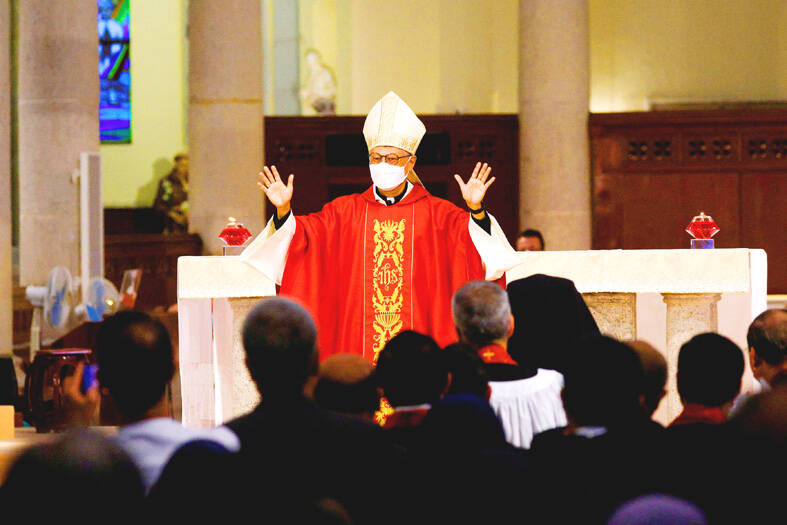Hong Kong’s Roman Catholic bishop yesterday said he had invited a leader of the Chinese Communist Party-controlled group for Catholics in mainland China to visit the territory, in a high-profile gesture aimed at improving strained Vatican relations with Beijing.
Hong Kong Bishop Stephen Chow (周守仁) said Joseph Li (李山), who is archbishop of Beijing in China’s state-recognized church hierarchy, appeared to be “quite positive” about the invitation, public broadcaster Radio Television Hong Kong (RTHK) reported.
The broadcaster gave no indication when Li might visit.

Photo: REUTERS
Chow announced the invitation on the last day of a five-day trip to Beijing, the first by a bishop of Hong Kong in nearly three decades.
Last month, the bishop said that his visit underscores the mission of the Hong Kong Diocese to be a bridge church and promote exchanges between the two sides.
However, the trip came as the Vatican and Beijing are split over the power to appoint bishops.
China and the Vatican severed diplomatic ties in 1951, following the communists’ rise to power and the expulsion of foreign priests.
Since the break in ties, Catholics in China have been divided between those who belong to an official, state-sanctioned church and an underground church loyal to the pontiff.
The Vatican recognizes members of both as Catholics, but claims the exclusive right to choose bishops.
In 2018, the two sides announced that they had reached a private accord, which regularized the status of several Chinese-appointed bishops and paved the way for future nominations.
An agreement on Catholic bishops has been renewed twice, most recently in October last year for two more years.
However, in November, a feud broke out over the installation of an auxiliary bishop in Jiangxi Province, which the Vatican does not recognize as a diocese
Earlier this month, Vatican News, the news portal of the Holy See, reported that China had unilaterally appointed a new bishop to Shanghai.
The agreement has been harshly criticized by many, including by Hong Kong Cardinal Joseph Zen (陳日君), who was in May last year detained on suspicion of colluding with foreign forces under a Beijing-imposed National Security Law that jailed or silenced many rights advocates.
He was released on bail and has yet to be formally charged, but he and five others were fined in a separate case for failing to register a now-defunct fund set up to help arrested protesters.
When Chow led a prayer yesterday, he said people should “love the country and love the church,” RTHK reported.
He later told reporters that everyone should learn how to do these two things at the same time.
“If you live in Hong Kong and China, then they should love their country,” he said.
Estimates of the total number of Chinese Catholics run between 6 million and 12 million, worshiping in both the recognized Patriotic Catholic Association and the underground church.
Chow was slated to conclude his trip yesterday. He visited churches and the tomb of Matteo Ricci, one of the first Jesuits to live in China, who died in Beijing in 1610.

Seven people sustained mostly minor injuries in an airplane fire in South Korea, authorities said yesterday, with local media suggesting the blaze might have been caused by a portable battery stored in the overhead bin. The Air Busan plane, an Airbus A321, was set to fly to Hong Kong from Gimhae International Airport in southeastern Busan, but caught fire in the rear section on Tuesday night, the South Korean Ministry of Land, Infrastructure and Transport said. A total of 169 passengers and seven flight attendants and staff were evacuated down inflatable slides, it said. Authorities initially reported three injuries, but revised the number

‘BALD-FACED LIE’: The woman is accused of administering non-prescribed drugs to the one-year-old and filmed the toddler’s distress to solicit donations online A social media influencer accused of filming the torture of her baby to gain money allegedly manufactured symptoms causing the toddler to have brain surgery, a magistrate has heard. The 34-year-old Queensland woman is charged with torturing an infant and posting videos of the little girl online to build a social media following and solicit donations. A decision on her bail application in a Brisbane court was yesterday postponed after the magistrate opted to take more time before making a decision in an effort “not to be overwhelmed” by the nature of allegations “so offensive to right-thinking people.” The Sunshine Coast woman —

BORDER SERVICES: With the US-funded International Rescue Committee telling clinics to shut by tomorrow, Burmese refugees face sudden discharge from Thai hospitals Healthcare centers serving tens of thousands of refugees on the Thai-Myanmar border have been ordered shut after US President Donald Trump froze most foreign aid last week, forcing Thai officials to transport the sickest patients to other facilities. The International Rescue Committee (IRC), which funds the clinics with US support, told the facilities to shut by tomorrow, a local official and two camp committee members said. The IRC did not respond to a request for comment. Trump last week paused development assistance from the US Agency for International Development for 90 days to assess compatibility with his “America First” policy. The freeze has thrown
TESTING BAN: Satellite photos show a facility in the Chinese city of Mianyang that could aid nuclear weapons design and power generation, a US researcher said China appears to be building a large laser-ignited fusion research center in the southwestern city of Mianyang, experts at two analytical organizations said, a development that could aid nuclear weapons design and work exploring power generation. Satellite photos show four outlying “arms” that would house laser bays, and a central experiment bay that would hold a target chamber containing hydrogen isotopes the powerful lasers would fuse together, producing energy, said Decker Eveleth, a researcher at US-based independent research organization CNA Corp. It is a similar layout to the US$3.5 billion US National Ignition Facility (NIF) in northern California, which in 2022 generated